Citroen C5 RHD 2015 (RD/TD) / 2.G Owner's Manual
Manufacturer: CITROEN, Model Year: 2015, Model line: C5 RHD, Model: Citroen C5 RHD 2015 (RD/TD) / 2.GPages: 344, PDF Size: 12.96 MB
Page 211 of 344

209
Pavement lighting
F Detach the cover and use a W 5W bulb.
Floor lighting
F Detach the cover and use a W 5W bulb.
Glove box
F Detach the cover and use a W 5W bulb.
8
Practical information
Page 212 of 344
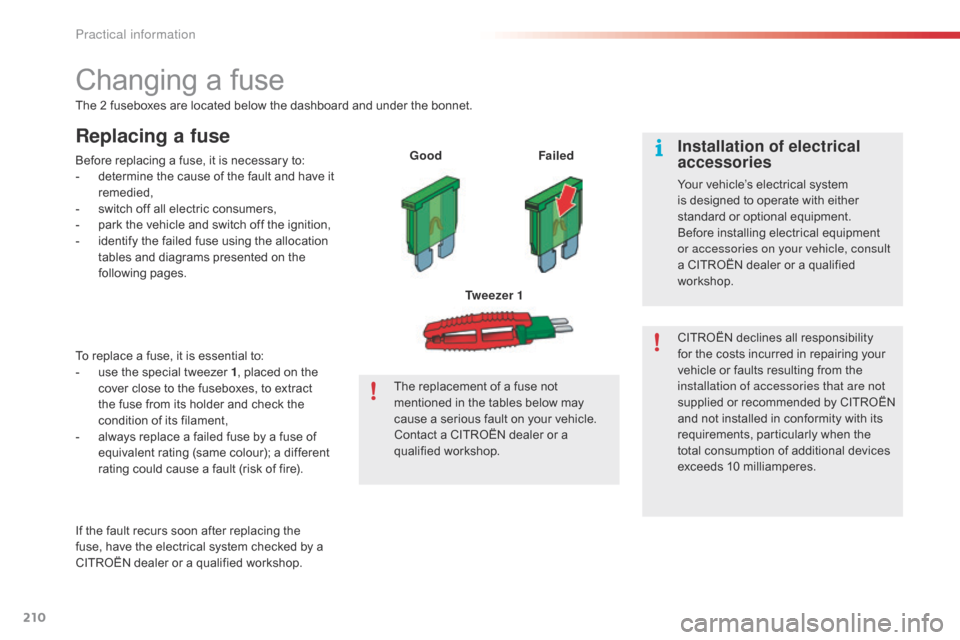
210
Changing a fuse
Replacing a fuse
Before replacing a fuse, it is necessary to:
- d etermine the cause of the fault and have it
remedied,
-
s
witch off all electric consumers,
-
p
ark the vehicle and switch off the ignition,
-
i
dentify the failed fuse using the allocation
tables and diagrams presented on the
following pages. Good
Failed
Tw e e z e r 1
To replace a fuse, it is essential to:
-
u
se the special tweezer 1 , placed on the
cover close to the fuseboxes, to extract
the fuse from its holder and check the
condition of its filament,
-
a
lways replace a failed fuse by a fuse of
equivalent rating (same colour); a different
rating could cause a fault (risk of fire).
If the fault recurs soon after replacing the
fuse, have the electrical system checked by a
CITROËN dealer or a qualified workshop. The replacement of a fuse not
mentioned in the tables below may
cause a serious fault on your vehicle.
Contact a CITROËN dealer or a
qualified workshop.
CITROËN declines all responsibility
for the costs incurred in repairing your
vehicle or faults resulting from the
installation of accessories that are not
supplied or recommended by CITROËN
and not installed in conformity with its
requirements, particularly when the
total consumption of additional devices
exceeds 10 milliamperes.Installation of electrical
accessories
Your vehicle’s electrical system
is designed to operate with either
standard or optional equipment.
Before installing electrical equipment
or accessories on your vehicle, consult
a CITROËN dealer or a qualified
workshop.
The 2 fuseboxes are located below the dashboard and under the bonnet.
Practical information
Page 213 of 344
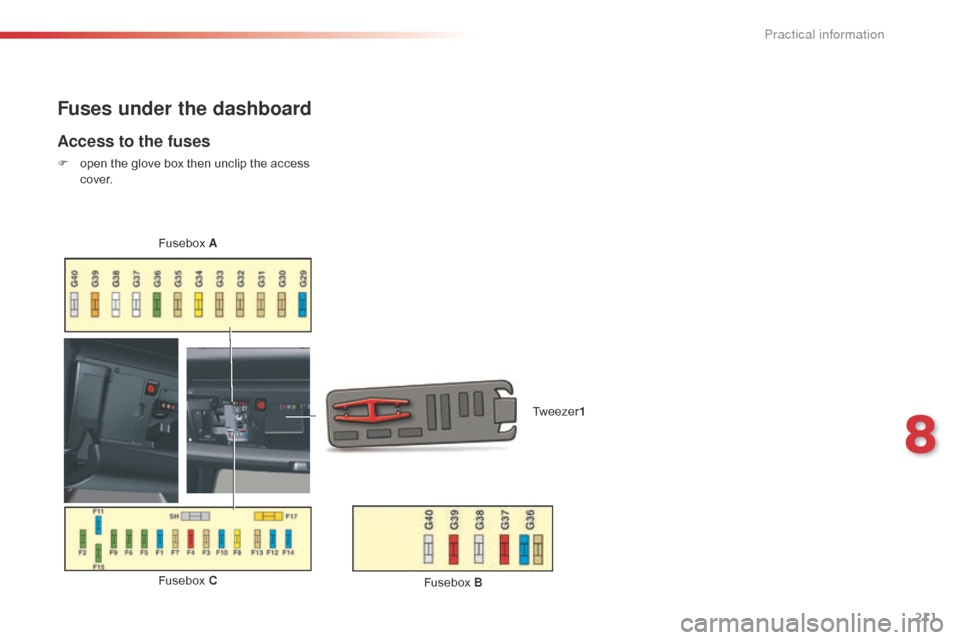
211
Fuses under the dashboard
Access to the fuses
F open the glove box then unclip the access c ove r.
Fusebox C
Fusebox
A
Tweezer1
Fusebox B
8
Practical information
Page 214 of 344
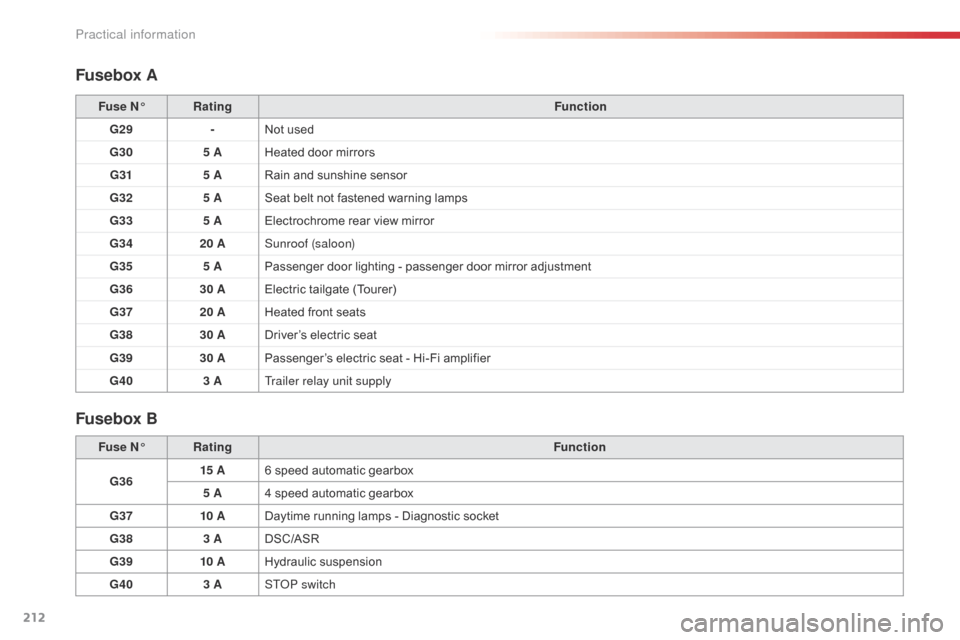
212
Fusebox B
Fuse N°Rating Function
G29 -Not used
G30 5 AHeated door mirrors
G31 5 ARain and sunshine sensor
G32 5 ASeat belt not fastened warning lamps
G33 5 AElectrochrome rear view mirror
G34 20 ASunroof (saloon)
G35 5 APassenger door lighting - passenger door mirror adjustment
G36 30 AElectric tailgate (Tourer)
G37 20 AHeated front seats
G38 30 ADriver’s electric seat
G39 30 APassenger’s electric seat - Hi-Fi amplifier
G40 3 ATrailer relay unit supply
Fuse N° Rating Function
G36 15 A
6 speed automatic gearbox
5 A 4 speed automatic gearbox
G37 10 ADaytime running lamps - Diagnostic socket
G38 3 ADSC/ASR
G39 10 AHydraulic suspension
G40 3 AST
o
P
switch
Fusebox A
Practical information
Page 215 of 344
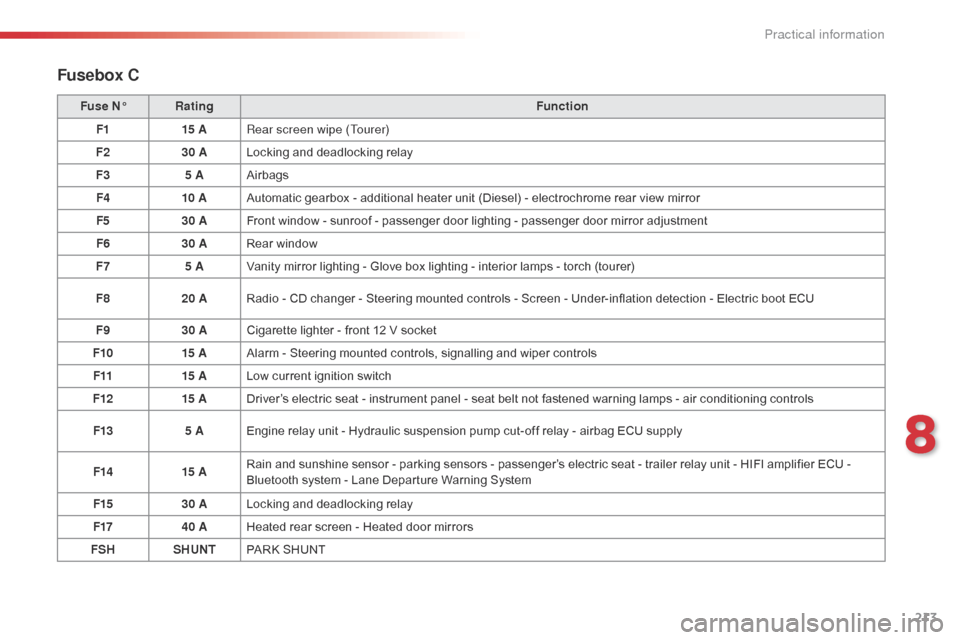
213
Fusebox C
Fuse N°Rating Function
F1 15 ARear screen wipe (Tourer)
F2 30 ALocking and deadlocking relay
F3 5 AAirbags
F4 10 AAutomatic gearbox - additional heater unit (Diesel) - electrochrome rear view mirror
F5 30 AFront window - sunroof - passenger door lighting - passenger door mirror adjustment
F6 30 ARear window
F7 5 AVanity mirror lighting - Glove box lighting - interior lamps - torch (tourer)
F8 20 ARadio - CD changer - Steering mounted controls - Screen - Under-inflation detection - Electric boot ECU
F9 30 ACigarette lighter - front 12 V socket
F10 15 AAlarm - Steering mounted controls, signalling and wiper controls
F11 15 ALow current ignition switch
F12 15 ADriver’s electric seat - instrument panel - seat belt not fastened warning lamps - air conditioning controls
F13 5 AEngine relay unit - Hydraulic suspension pump cut-off relay - airbag ECU supply
F14 15 ARain and sunshine sensor - parking sensors - passenger’s electric seat - trailer relay unit - HIFI amplifier ECU -
Bluetooth system - Lane Departure Warning System
F15 30 ALocking and deadlocking relay
F17 40 AHeated rear screen - Heated door mirrors
FSH SHUNTPARK SHUNT
8
Practical information
Page 216 of 344
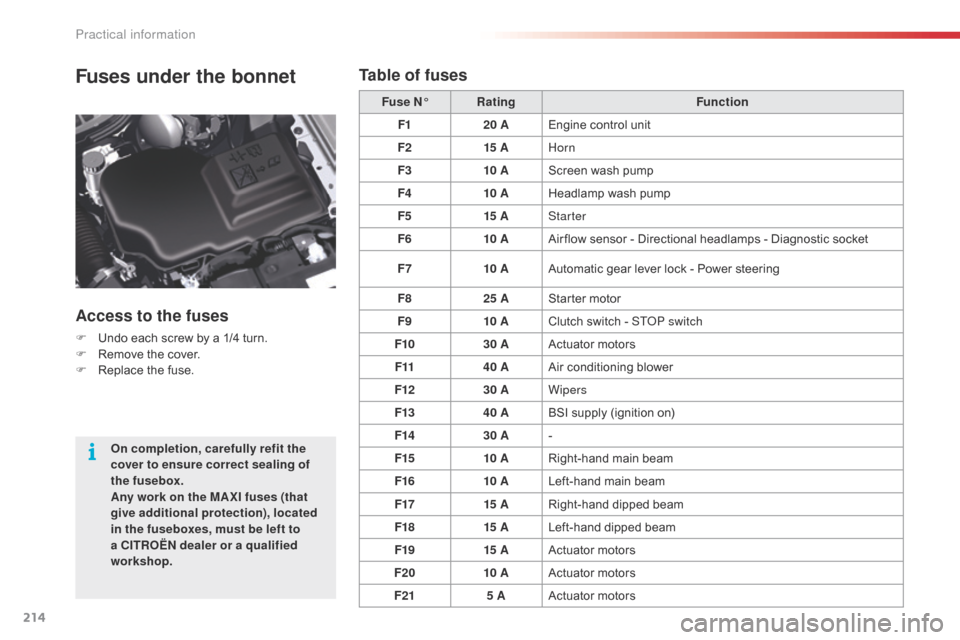
214
Fuses under the bonnet
Access to the fuses
F Undo each screw by a 1/4 turn.
F R emove the cover.
F
R
eplace the fuse. Fuse N°
Rating Function
F1 20 AEngine control unit
F2 15 AHorn
F3 10 AScreen wash pump
F4 10 AHeadlamp wash pump
F5 15 AStarter
F6 10 AAir flow sensor - Directional headlamps - Diagnostic socket
F7 10 AAutomatic gear lever lock - Power steering
F8 25 AStarter motor
F9 10 AClutch switch - S
T
o
P s
witch
F10 30 AActuator motors
F11 40 AAir conditioning blower
F12 30 AWipers
F13 40 ABSI supply (ignition on)
F14 30 A-
F15 10 ARight-hand main beam
F16 10 ALeft-hand main beam
F17 15 ARight-hand dipped beam
F18 15 ALeft-hand dipped beam
F19 15 AActuator motors
F20 10 AActuator motors
F21 5 AActuator motors
On completion, carefully refit the
cover to ensure correct sealing of
the fusebox.
Any work on the MA XI fuses (that
give additional protection), located
in the fuseboxes, must be left to
a CITROËN dealer or a qualified
workshop.
Table of fuses
Practical information
Page 217 of 344

215
Table of fuses
Fuse N°Rating Function
F6 25 ARear 12 V socket (max power: 100 W)
F7 15 AFoglamps
F8 20 AAdditional burner (Diesel)
F9 30 AElectric parking brake
8
Practical information
Page 218 of 344
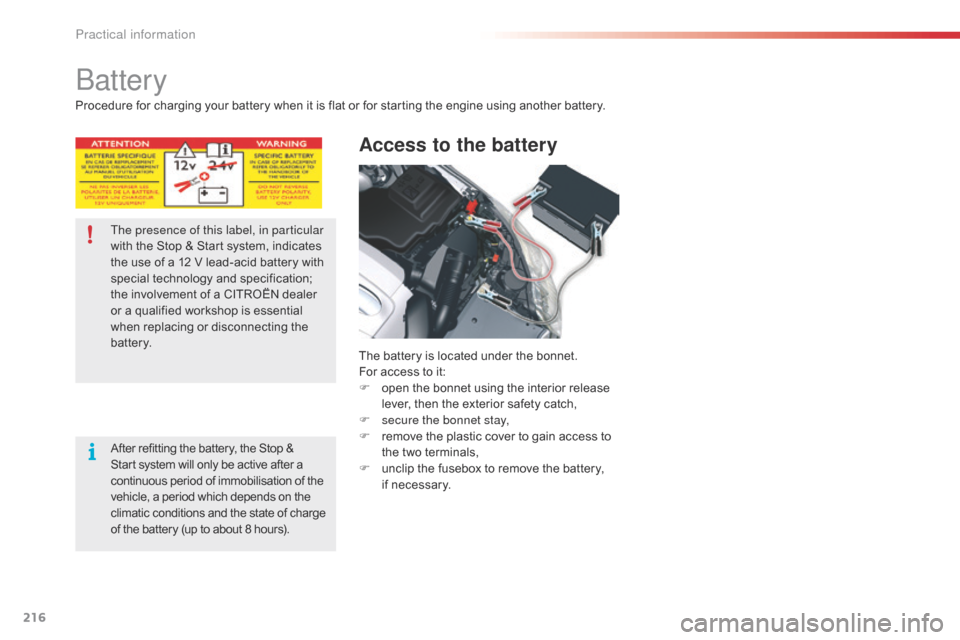
216
battery
Access to the battery
The battery is located under the bonnet.
For access to it:
F
o
pen the bonnet using the interior release
lever, then the exterior safety catch,
F
s
ecure the bonnet stay,
F
r
emove the plastic cover to gain access to
the two terminals,
F
u
nclip the fusebox to remove the battery,
if
necessary.
The presence of this label, in particular
with the Stop & Start system, indicates
the use of a 12 V lead-acid battery with
special technology and specification;
the involvement of a CITROËN dealer
or a qualified workshop is essential
when replacing or disconnecting the
battery.
After refitting the battery, the Stop &
Start system will only be active after a
continuous period of immobilisation of the
vehicle, a period which depends on the
climatic conditions and the state of charge
of the battery (up to about 8 hours).
Procedure for charging your battery when it is flat or for starting the engine using another battery.
Practical information
Page 219 of 344

217
Following reconnection of
the battery
Following reconnection of the battery,
switch on the ignition and wait 1 minute
before starting to permit initialisation
of the electronic systems. However, if
slight malfunctions remain following this
operation, contact a CITROËN dealer
or a qualified workshop.
Referring to the corresponding section,
you must yourself reinitialise:
-
t
he remote control key,
-
t
he glass panoramic roof blind,
-
t
he GPS satellite navigation
system.
Starting using another
battery
F Connect the red cable to the positive terminal (+) of the flat battery A , then to the
positive terminal (+) of the slave battery B.
F
C
onnect one end of the green or black
cable to the negative terminal (-) of the
slave battery B .
F
C
onnect the other end of the green or black
cable to the earth point C on the broken
down vehicle.
F
O
perate the starter, let the engine run.
F
W
ait until the engine returns to idle and
disconnect the cables.
Charging the battery using
a battery charger
F Disconnect the battery from the vehicle.
F F ollow the instructions for use provided by
the manufacturer of the charger.
F
R
econnect starting with the negative
terminal (-).
F
C
heck that the terminals and connectors
are clean. If they are covered with sulphate
(whitish or greenish deposit), remove them
and clean them. With Stop & Start, the battery does not
have to be disconnected for charging.
Before disconnecting the battery
Wait 2 minutes after switching off
the ignition before disconnecting the
battery.
Close the windows and the doors
before disconnecting the battery.
8
Practical information
Page 220 of 344

218
Some functions are not available if the
battery is not sufficiently charged.
Protect your eyes and face before
handling the battery.
All operations on the battery must be
carried out in a well ventilated area and
away from naked flames and sources
of sparks, so as to avoid the risk of
explosion or fire.
Do not try to charge a frozen battery;
the battery must first be thawed out to
avoid the risk of explosion. If the battery
has been frozen, before charging have
it checked by a CITROËN dealer or a
qualified workshop who will check that
the internal components have not been
damaged and the casing is not cracked,
which could cause a leak of toxic and
corrosive acid.
Do not reverse the polarity and use only
a 12 V charger.
Do not disconnect the terminals while
the engine is running.
Do not charge the batteries without
disconnecting the terminals first.
Wash your hands after wards.
It is advisable to disconnect the battery
if the vehicle is to be left unused for
more than one month.The batteries contain harmful substances
such as sulphuric acid and lead. They
must be disposed of in accordance
with regulations and must not, in any
circumstances, be discarded with household
waste.
Take used remote control batteries and
vehicle batteries to a special collection point.
do not push the vehicle to start the
engine if you have an electronic or
automatic gearbox.
Practical information